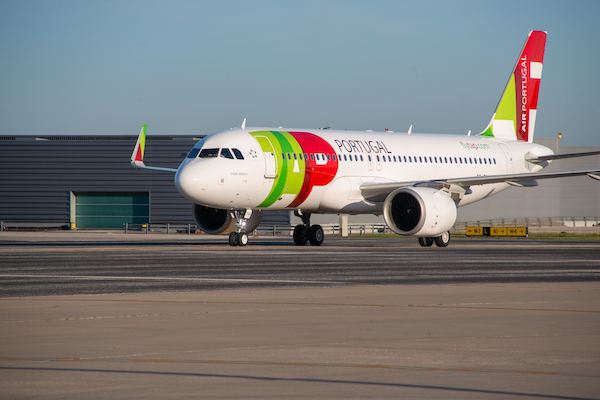TAP Air Portugal has reported a significant reduction in its first-quarter losses, signalling a positive trend in its ongoing recovery efforts.
The airline’s strategic focus on operational efficiency and market expansion has contributed to this improvement, despite challenging market conditions.
Operational Improvements and Financial Performance
TAP Air Portugal has made notable strides in mitigating losses, as evidenced by its first-quarter results. The airline reported a net loss of €71.9 million, a significant improvement of €14.5 million compared to the previous year. This marks a continued recovery effort, and compared to the first quarter of 2019, the net loss reduction stood at €34.7 million. This improvement highlights TAP’s commitment to its strategic transformation plan. Operating revenues improved by 3.1%, reaching €862 million.
Passenger numbers showed a slight increase, edging up by 0.3%, while capacity expanded by 3.8%. This growth trajectory indicates a positive market response to TAP’s capacity additions. The airline’s operational host included a diverse fleet comprising 22 wide-body long-haul Airbus A330s, 58 narrow-body Airbus A319/A320/A321neos, and 19 regional aircraft, which proved instrumental in enhancing its operational capabilities and service delivery.
Strategic Focus on Workforce and Labour Agreements
Chief executive Luís Rodrigues articulated the strategic focus on workforce management, indicating that investments in personnel have been prioritised. Significant measures have been undertaken including the cessation of salary cuts, adjusting for inflation, and establishing new collective labour agreements. These initiatives, while impacting short-term profitability, are viewed as crucial to long-term organisational health.
Rodrigues emphasized, “We trust fully in our people, and we know we will be up to the challenge of a strong summer. Our focus and commitment remain unchanged – to establish TAP into a sustainably profitable airline.” These remarks underlie the confidence in the company’s human resources strategy, aligning with the broader operational objectives.
Enhancing Capacity and Market Presence
The first quarter of 2024 marked a period of growth, with significant enhancements in capacity and market presence. Capacity growth was quantified at 3.8%, reflecting TAP’s strategic intent to capture a larger share of the air travel market. This was complemented by a more robust performance in passenger numbers.
TAP has managed to optimise load factors, with improvements in both punctuality and regularity. This operational efficiency has not only enhanced service delivery on congested routes but has also reaffirmed its reputation as a reliable service provider. This progress is crucial in TAP’s broader strategy to strengthen its foothold in competitive sectors.
Focus on Key Markets: Brazil and North America
TAP Air Portugal is proactively expanding its footprint in key markets, particularly Brazil and North America. With a notable boost in frequency to these regions, TAP is poised to enhance its network connectivity and market reach. This strategic pivot seeks to leverage the demand dynamics and cater to growing customer bases in these critical regions.
The airline’s leadership is poised to capitalise on this momentum, with strategic initiatives aligned towards increasing flight frequencies. This is expected to foster growth in passenger numbers and subsequently improve revenue outcomes. TAP’s focused market strategy aligns with its long-term vision of sustainable profitability.
Operational Challenges and Infrastructure
Despite the positive trajectory, TAP Air Portugal faces several operational challenges, primarily due to infrastructure constraints. Congestion remains a pressing issue, affecting turnaround times and scheduling regularity. The airline’s ability to navigate these constraints effectively is critical to maintaining service standards and operational efficiency.
Infrastructure challenges notwithstanding, TAP’s punctuality metrics have shown improvement, signalling effective management. This operational turnaround is attributed to meticulous planning and strategic deployment of resources to mitigate disruptions and maximise efficiency.
The airline’s operational execution relies heavily on optimised resource allocation, ensuring that capacity increments translate into enhanced service reliability. This systematic approach is essential in TAP’s ongoing journey towards operational excellence.
Commitment to Stakeholder Engagement
TAP Air Portugal remains steadfast in its commitment to stakeholder engagement, a fundamental component of its corporate strategy. The airline strives to position itself as one of the most attractive companies in the sector. This involves aligning its operational strategies with the expectations and interests of its diverse stakeholder base.
Rodrigues reiterated this commitment, stating, “We are dedicated to our stakeholders and aim to establish enduring relationships built on trust and performance.” This focus on stakeholder relations is pivotal to ensuring sustained support and confidence in TAP’s strategic initiatives.
Conclusion
TAP Air Portugal’s first-quarter performance presents a promising outlook amidst ongoing challenges. Through strategic enhancements in operational performance, market presence, and stakeholder engagement, TAP is set to establish itself as a sustainable and profitable airline, driving value for all stakeholders involved.
TAP Air Portugal’s efforts to refine its operational strategies and enhance market presence have yielded positive results.
These initiatives underscore the airline’s commitment to achieving sustainable profitability and strengthening its position in the aviation industry.

